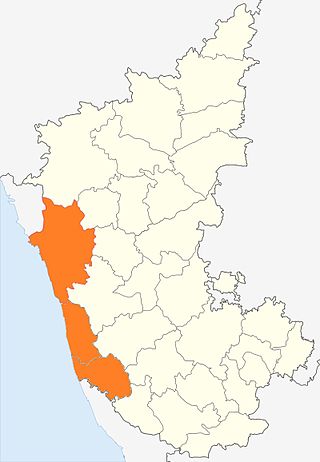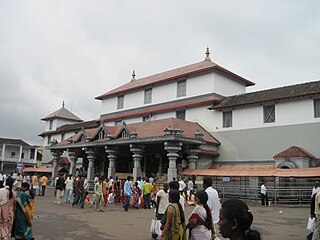This article needs additional citations for verification .(May 2013) |
This is a list of Hindu ( Sanatana ) temples in Tulu Nadu, a region in the southern Indian state of Karnataka, comprising present day Dakshina Kannada, Udupi district of Karnataka state and Kasargod district of Kerala state . Tulu Nadu is famous for numerous temples dedicated to Ganapati, Subrahmanya, Vishnu, Shiva, Durga, Lakshmi, Guru and hundreds of temples of other deities.
| Deity | Temple Name | Location |
|---|---|---|
| Ganesh | Swastika Ganapathi/Vinayaka Temple | Southadka, Kokkada Sharavu, Kodialbail Ganeshpura, Katipalla Nadsal, Someshwara Anegudde, Kumbhashi [1] Hattiangadi, Kundapura Idagunji,Honnavara |
| Subrahmanya | Swastika Subrahmanya/Subraya Temple | Kukke, Kukke Subrahmanya Katukukke, Perla Kadandale, Moodabidre Thokur, Haleangadi Guddemmadi, Senapura |
| Vishnu | Swastika Vishnu murthi temple | Kulai, Mangalore Arur, Udupi
Punarur, Talipady Panambur,Thokur |
| Swastika Anantha Padmanabha Temple | Kudupu, Vamanjoor | |
| Swastika Narayana Temple | Anjar, Udupi | |
| Swastika Venkataramana Temple | Carstreet, Mangalore Tirumala, Bantwala Paner, Bantwala Carstreet, Puttur Laila, Belthangadi Karnad, Mulky Carstreet, Kasaragod | |
| Shiva/Vishnu | Swastika Shankarnarayana Temple | Nandavara, Melkar Shankaranarayana, Haladi Koliyoor, Udupi |
| Shiva | Swastika Mahalingeshwara Temple | Carstreet, Puttur
mulleria*Ajapila, Bellare |
| Swastika Somanatheshwara Temple | Puthige, Moodabidre, Someshwara, Ullal Kuthyar, Belthangadi Kurnad, Mudipu | |
| Swastika Sadashiva Temple | Surathkal, Mangalore, Narahari Parvata, Amtoor
Ambar, Mangalapadi | |
| Swastika Panchalingeshwara Temple | Kavu, Puttur Vittla, Bantwala Parivara, Panja Kundakushi, Beddadka | |
| Swastika Anantheshwara Temple | Ballamanja, Machina Carstreet, Udupi Bengre, Manjeshwaram | |
| Swastika Manjunatha Temple | Kadri, Mangalore Dharmasthala, Belthangadi | |
| Swastika Mallikarjuna Temple | Thodikana, Sullia Carstreet, Kasaragod | |
| Swastika Kundeshwara Temple | Carstreet, Kundapura Vadera, Kundapura | |
| Swastika Agastyeshwara Temple | Kiri Manjeshwara, Kundapura | |
| Swastika Adinatheshwara Temple | Adyapadi, Bajpe | |
| Swastika Amrutheshwara Temple | Tiruvailu, Vamanjoor | |
| Swastika Udaneshwara Temple | Perdala, Katukukke | |
| Swastika Kotilingeshwara Temple | Koteshwara, Kundapura | |
| Swastika Karinjeshwara Temple | Karinja, Kavala Padoor | |
| Swastika Gokarnanatheshwara Temple | Kudroli, Mangalore | |
| Swastika Chandramoulishwara Temple | Carstreet, Udupi | |
| Swastika Trayambakeshwara Temple | Kalnad, Kasaragod | |
| Swastika Tuluveshwara Temple | Basrur, Kundapura | |
| Swastika Nandaneshwara Temple | Panamboor, Thokur | |
| Swastika Brahmalingeswara Temple | Maranakatte, Chittur | |
| Swastika Madhanantheshwara Temple | Madhur, Kasaragod | |
| Swastika Ramakunjeshwara Temple | Ramakunja, Uppinangadi | |
| Swastika Vishweshwara Temple | Yellur, Udupi | |
| Swastika Vishwakarmeshwara Temple | Yennegudde, Katapadi | |
| Swastika Sahasralingeshwara Temple | Dakshina Kashi/Gaya, Uppinangadi | |
| Swastika Seneshwara Temple | Shiroor, Byndoor | |
| Swastika Harihareshwara Temple | Harihara Pallathaka | |
| Shakti/ Durga | Om Parashakthi Kshetra | Madyar, Kotekar |
| Om Durgaparameshwari Temple | Bappanadu, Mulky Kateel, Kondemula Chitrapura, Kulai Eruvailu, Moodabidre Devipura, Talapady [3] Montethadka, Shibaje Sharavoor, Alankar Mandarthi, Barkur [4] Uppunda, Kundapura Nandalike, Belman Kunjarugiri, Udupi Soukur, Kundapura Kemmannu, Nitte Malla, Muliyar Mundol, Karadka Aiyala, Uppala Agalpadi, Umbrangala | |
| Om Jaya/Pancha/Brahmi Durgaparameshwari Temple | Kannarpadi, Udupi Poonja, Arambodi Kamalashile, Kundapura | |
| Om Mahishamardini Temple | Neelavara, Barkur Kadiyali, Udupi | |
| Om Mookambika Temple | Kollur, Jadkal | |
| Lakshmi/Vishnu | Sri Lakshmi Janardhana Temple | Ellur, Karkala |
| Sri Lakshmi Narasimha Temple | Kadeshwalya, Mani | |
| Matrika | Sri Amrutheshwari Temple | Kota, Brahmavara |
| Sri Khadgeshwari Temple | Madhya, Soorinje | |
| Sri Mangaladevi Temple | Bolara, Mangalore | |
| Sri Rajarajeshwari Temple | Polali, Kariangala | |
| Sri Mariyamma Temple | Halekote, Bolar, Mangalore Marigudi, Kaup Marigudi, Karkala Moornad, Kaup | |
| Dashavatara | Swastika Gopalakrishna Temple | Kannipura, Kumble |
| Swastika Gopinatha Temple | Attavara, Mangalore | |
| Swastika Chennakeshava Temple | Carstreet, Sullia | |
| Swastika Narasimha Temple | Saligrama, Brahmavara Rattadi, Udupi | |
| Swastika Ramachandra Temple | Ashwathapura, Kadandale | |
| Rudravathara | Swastika Mukhyaprana Temple | Halekote, Mangalore |
| Swastika Hanumantha Temple | Hampankatte, Mangalore | |
| Swastika Veerabhadra Temple | Hiriadka, Udupi | |
| Surya | Swastika Soorya Narayana Temple | Maroli, Padil Naravi, Belthangadi |
| Nagabrahma | Swastika Nagabrahma Temple | Paduperara, Bajpe |
| Guru | Shirdi Saibaba Temple | Ladyhill, Mangalore Kudroli, Mangalore Shamboor, Bantwala |
| Brahma Shree Narayana Guru Temple | Kolya, Kotekar Karnad, Mulky Bappallige, Puttur Ganadapadpu, Bantwala |














